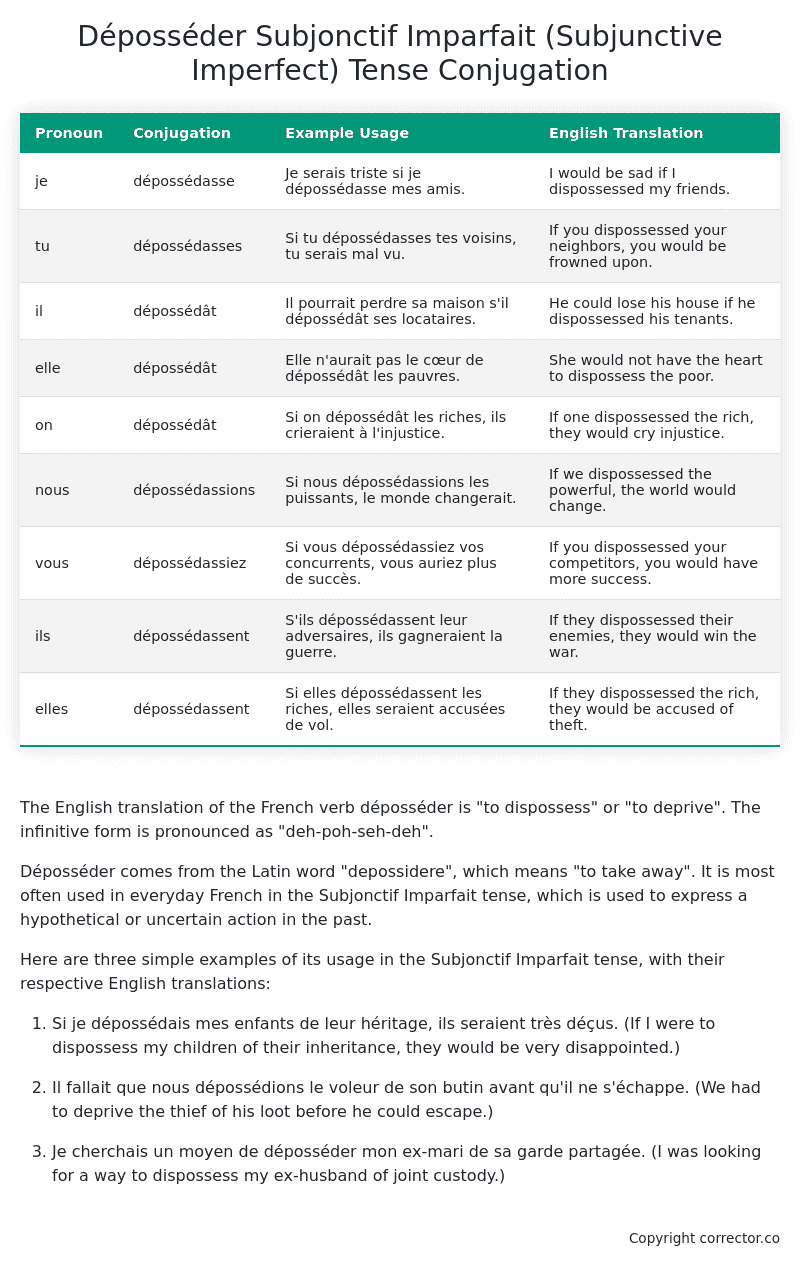Subjonctif Imparfait (Subjunctive Imperfect) Tense Conjugation of the French Verb déposséder
Introduction to the verb déposséder
The English translation of the French verb déposséder is “to dispossess” or “to deprive”. The infinitive form is pronounced as “deh-poh-seh-deh”.
Déposséder comes from the Latin word “depossidere”, which means “to take away”. It is most often used in everyday French in the Subjonctif Imparfait tense, which is used to express a hypothetical or uncertain action in the past.
Here are three simple examples of its usage in the Subjonctif Imparfait tense, with their respective English translations:
-
Si je dépossédais mes enfants de leur héritage, ils seraient très déçus. (If I were to dispossess my children of their inheritance, they would be very disappointed.)
-
Il fallait que nous dépossédions le voleur de son butin avant qu’il ne s’échappe. (We had to deprive the thief of his loot before he could escape.)
-
Je cherchais un moyen de déposséder mon ex-mari de sa garde partagée. (I was looking for a way to dispossess my ex-husband of joint custody.)
Table of the Subjonctif Imparfait (Subjunctive Imperfect) Tense Conjugation of déposséder
| Pronoun | Conjugation | Example Usage | English Translation |
|---|---|---|---|
| je | dépossédasse | Je serais triste si je dépossédasse mes amis. | I would be sad if I dispossessed my friends. |
| tu | dépossédasses | Si tu dépossédasses tes voisins, tu serais mal vu. | If you dispossessed your neighbors, you would be frowned upon. |
| il | dépossédât | Il pourrait perdre sa maison s’il dépossédât ses locataires. | He could lose his house if he dispossessed his tenants. |
| elle | dépossédât | Elle n’aurait pas le cœur de dépossédât les pauvres. | She would not have the heart to dispossess the poor. |
| on | dépossédât | Si on dépossédât les riches, ils crieraient à l’injustice. | If one dispossessed the rich, they would cry injustice. |
| nous | dépossédassions | Si nous dépossédassions les puissants, le monde changerait. | If we dispossessed the powerful, the world would change. |
| vous | dépossédassiez | Si vous dépossédassiez vos concurrents, vous auriez plus de succès. | If you dispossessed your competitors, you would have more success. |
| ils | dépossédassent | S’ils dépossédassent leur adversaires, ils gagneraient la guerre. | If they dispossessed their enemies, they would win the war. |
| elles | dépossédassent | Si elles dépossédassent les riches, elles seraient accusées de vol. | If they dispossessed the rich, they would be accused of theft. |
Other Conjugations for Déposséder.
Le Present (Present Tense) Conjugation of the French Verb déposséder
Imparfait (Imperfect) Tense Conjugation of the French Verb déposséder
Passé Simple (Simple Past) Tense Conjugation of the French Verb déposséder
Passé Composé (Present Perfect) Tense Conjugation of the French Verb déposséder
Futur Simple (Simple Future) Tense Conjugation of the French Verb déposséder
Futur Proche (Near Future) Tense Conjugation of the French Verb déposséder
Plus-que-parfait (Pluperfect) Tense Conjugation of the French Verb déposséder
Passé Antérieur (Past Anterior) Tense Conjugation of the French Verb déposséder
Futur Antérieur (Future Anterior) Tense Conjugation of the French Verb déposséder
Subjonctif Présent (Subjunctive Present) Tense Conjugation of the French Verb déposséder
Subjonctif Passé (Subjunctive Past) Tense Conjugation of the French Verb déposséder
Subjonctif Imparfait (Subjunctive Imperfect) Tense Conjugation of the French Verb déposséder (this article)
Subjonctif Plus-que-parfait (Subjunctive Pluperfect) Tense Conjugation of the French Verb déposséder
Conditionnel Présent (Conditional Present) Tense Conjugation of the French Verb déposséder
Conditionnel Passé (Conditional Past) Tense Conjugation of the French Verb déposséder
L’impératif Présent (Imperative Present) Tense Conjugation of the French Verb déposséder
L’infinitif Présent (Infinitive Present) Tense Conjugation of the French Verb déposséder
Struggling with French verbs or the language in general? Why not use our free French Grammar Checker – no registration required!
Get a FREE Download Study Sheet of this Conjugation 🔥
Simply right click the image below, click “save image” and get your free reference for the déposséder Subjonctif Imparfait tense conjugation!

Déposséder – About the French Subjonctif Imparfait (Subjunctive Imperfect) Tense
Formation
Common Everyday Usage Patterns
Interactions with Other Tenses
Subjonctif Présent
Indicatif Passé Composé
Conditional
Conditional Perfect
Summary
I hope you enjoyed this article on the verb déposséder. Still in a learning mood? Check out another TOTALLY random French verb conjugation!


